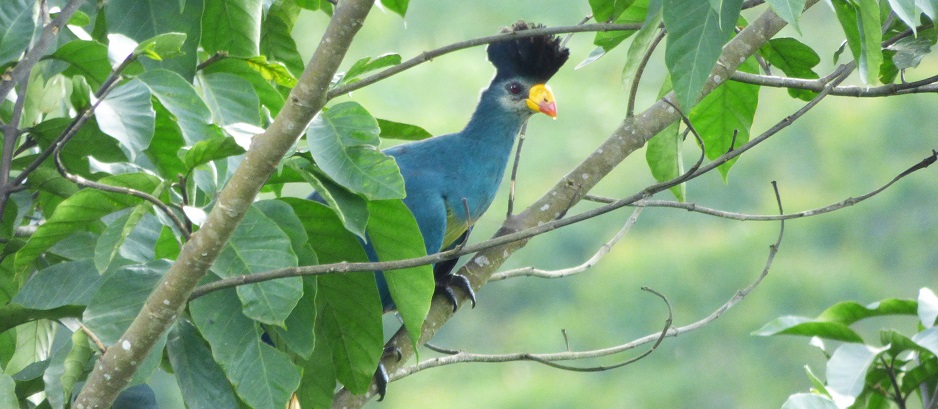
Life on the edge of Kibale Forest during the rainy season
The chimpanzees of Kibale Forest have been screeching loudly for the past two weeks. I’ve stayed here at Sunbird Hill many times, but never have I heard them so close or so often.
On the drive back from Fort Portal yesterday, Julia stopped the car along the track to her land to enquire what John (in his bright yellow National Resistance Movement T-shirt) was working on. “I’m looking at the chimpanzees,” he said. And there they were, half a dozen of them, high in a medium size fig tree on the boundary of Kibale Forest.

A chimpanzee sits high in a tree in Kibale Forest bordering Sunbird Hill

Chimpanzee climbing down a fig tree, on the edge of Kibale Forest at Sunbird Hill
Today we venture to the forest edge, tracing the sound of the primates. “One of the females may be in oestrus,” says primatologist Julia, trying to explain the exuberant din.
On our walk, we come across a pile of fresh dung – full of industrious dung beetles. Where did the dung come from? We do not find any footprints – either elephant or buffalo – only a broken Albizzia branch. Elephants are known to love Albizzia trees; Julia has seen the elephants in the very same spot before.
We last saw elephants just five minutes’ drive from here. Julia filmed some Forest Elephants crossing the Fort Portal to Kamwenge Road that passes through Kibale Forest. You can see a short clip on the Sunbird Hill Facebook page below.
I saw a Forest Elephant last week too – from the back of a matatu taxi; the Ugandan passengers (particularly the toddler in front of me) were in awe!
Back at Sunbird Hill, we inspect the freshly-cut trails on our walk back towards the Birders’ Lounge. Flowers, flowers, everywhere: we’ve loved the Aloe flower; the Kagelia’s dark red flowers are striking, even beneath the dark canopy. The vantage point from Julia’s towering treehouse office reveals bright red Jatropha flowers that are not visible from the ground. From here, we have watched the Black-crowned Waxbills weave a dainty nest in the mango tree. The entrance is a narrow tunnel, below the nest itself.

Red-bellied Paradise Flycatcher incubating eggs on its nest at Sunbird Hill on the edge of Kibale Forest
I’ve never seen so many nesting birds as we see now. The Red-bellied Paradise Flycatcher has flown the nest, as has the African Blue Flycatcher. One morning after a heavy storm, Dillon noticed an Olive-bellied Sunbird chick and its nest on the ground. Julia scooped them up (away from the jaws of three dogs and a cat!) and moved them into a safer position. The chick survived. After a week, it was gone… we hope it survived.
It’s quarter to seven in the evening. In the distance I hear the Yellow-spotted Barbet (making a whirring noise, like a woodpecker). Closer by is Easter. We enjoyed his brother Christmas.

I wouldn’t annoy Easter the turkey!
The remaining turkey has had a reprieve. The family has become used to his comical gobbling noises. Easter has been renamed Easter 2019! No-one is in a rush to lose his friendly tones (although 7-year-old Dillon is petrified of this massive bird with an even bigger attitude!)
Today we have had a reprieve from the season’s thunderstorms and drizzle.

April sunset from Butterfly Cottage, Sunbird Hill
After Saturday morning’s heavy rain, we had a fiercely hot few hours of sunshine. Stepping onto the veranda at dusk was like walking into a filmset: my friends sat bathed in orange and pink light, in front of a ravishing backdrop of cotton wool cloud sky and the dark outline of the forest. The magical ambience was enhanced by the flickering of a thousand wings, a flight (can I call them that?) of enswa (white ants). They did not fly but floated, rising upwards from the long green grass (which clearly hid a termite mound!) I opened my eyes wide to take in every second of it.
The romance of the moment was short-lived as we batted away insect after insect, picked enswa from inside our clothes, our drinks and everywhere else!
Thankfully the enswa invasion was short-lived. The next day, the veranda – and even my mattress – was a sea of wings. The ants themselves had vanished.
Nights on the forest edge can be very dark. Last night Venus shone brightly above Kibale Forest.




























Yes indeed this was elephant dung. One night at around 9 o’clock, I heard lots of children screaming and shouting. It took me a while to realise that the elephants had invaded the crops of the farms behind us and it was ‘all hands on deck’ as the whole family made as much noise as they possibly could to try and chase them away. It’s one thing to enjoy seeing elephants when you’re on safari but an altogether different situation when you’re a subsistence farmer who has no other way of surviving other than through crop farming.
Later on Saturday afternoon, we found a huge pile of fresh elephant dung on Julia’s land. With the toe of one of his gumboots, Sebastiano opened up the pile of dung to show a jackfruit seed.
“We need evidence like this to show Uganda Wildlife Authority (UWA) that the elephants have been crop raiding.” Jackfruit trees are cultivated in people’s gardens.
Today I had a chance to meet Wilson, one of the villagers who is employed by UWA helping to excavate a 2 km long trench that will help to protect villagers from the hungry elephants. This trench skirts along the edge of the forest between the village of Kyabakwere and Sunbird Hill. This should make a huge difference to local people. Sebastiano almost had to drop out of school when his family’s crops were destroyed by elephants (meaning there was no money for school fees). This dilemma is everyday life for many Africans and a subject I came to learn a lot about when I was a volunteer with the Uganda Conservation Foundation, fundraising for solutions to human wildlife conflict.
Here’s a favourite blog from Ishasha in Queen Elizabeth National Park: “Why I love elephant dung.”
I was very interested to see Easter turkey. Is it the same as Christmas turkey? Have you dispatched it and if you have did you use the baster??
LOL Ma.
Easter seems to have become a permanent fixture! We love his gobble gobble noises! And he’s a great ‘guard dog.’
Perhaps you could bring my baster home for Christmas. There could be something to baste!
It is with great regret that we announce the untimely – or should I say unseasonal – demise of Easter!
We had all become rather fond of his gob-gob-gobbling noises but he is no more. Last week s/he was attacked by one of our neighbour’s dogs so we had to put him out of his misery. Given the circumstances, no-one had much of a stomach for the inevitable …
RIP Easter.
I couldn’t have chosen a better place to spend lockdown…
When the President closed schools in March 2020, I jumped on the Link bus to make sure I was here on the edge of Kibale Forest- and here I still am – almost one year later. Every day I thank my lucky stars that this is my home.
I have frequently felt isolated but I always feel safe.
Every morning I walk to the edge of the forest. Just a few minutes reconnecting with nature is enough to reset my brain. Lockdown has been the most amazing opportunity to learn more bird calls, develop a rudimentary knowledge of butterflies, and reconnect with nature on a deeper level.
Follow my #LockdownDiaries for stories about the birds, butterflies, moths, beetles, monkeys and other primates that inhabit this beautiful corner of Uganda.